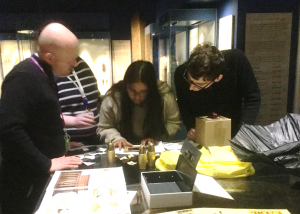Postgraduates plan their escape!
By Dr Simon Rees
Head of Researcher Development
Since October, a group of postgraduates from across the University have been designing Escape Rooms based within the Oriental Museum. Themed around spies and Pharaohs, the postgraduates were challenged with designing a puzzling experience using objects from the collection.

Escape Rooms involve a group of participants being “locked” in a room from which they have one hour to escape by solving a series of puzzles and challenges. Grounded in Flow theory (Csíkszentmihályi, 1996), escape rooms aim to create an immersive experience where participants enter a concentrated and focused state to solve a problem. This is a learning state where skill level and challenge level are at the optimal level in relation to each other. Learners in this flow state experience total immersion and often lose track of time.
Inspired by Richard Feynman’s quote, reflecting on undertaking research, “The first principle is that you must not fool yourself — and you are the easiest person to fool”; The project has explored what it means to be a successful researcher with the aim of developing a wide range of skills such as:
– Creative thinking;
– Logical thinking;
– Collaborative and team work skills;
– Persistence;
– Puzzle design;
– Developing narrative;
– Presentation skills.
Having received training on puzzle and room design, the Postgraduate students designed their own Escape Rooms set within the Oriental museum. They demonstrated outstanding creative thinking to produce novel and appropriate puzzles and the Escape Rooms have now been used by staff from across the university engaged in project leadership development courses and were very well received with comments such as:
“I thought this was fascinating and great fun”.
“Very engaging and fun experience. Insightful to have to problem solve with others”.
“Definitely like to do this with my research cluster”.
The Researcher Development team hope to continue to develop this concept and apply the idea in new contexts. We are always pleased to hear from anyone interested in being involved and can be contacted on [email protected].
Csíkszentmihályi, M. (1996). Flow and the psychology of discovery and invention. Harper Collins.
